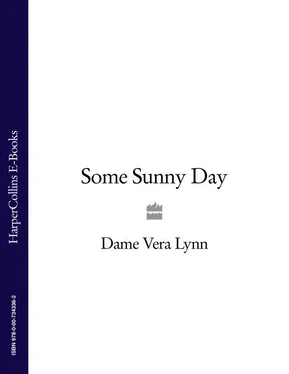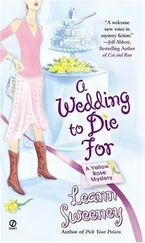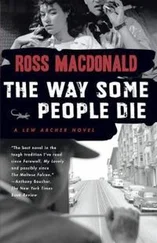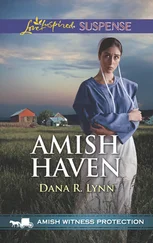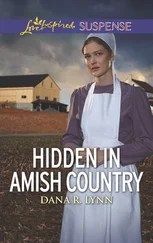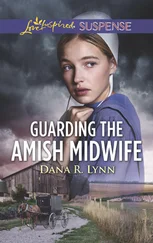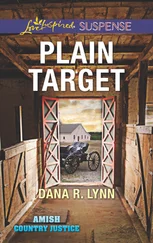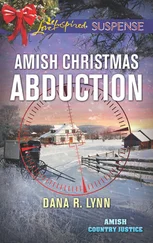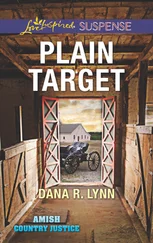Neither Santos nor Charlie had heard me before, as I hadn’t done a broadcast by then; so it wasn’t by any means a walkover or a foregone conclusion. It was between me and several other girls, and I didn’t think I was really sophisticated enough for them. Eventually the choice was narrowed down to me and one other girl, and after what seemed like a good deal of debate and consultation, they picked me. I could hardly believe it—within the space of a week I’d auditioned for, and been accepted by, two very important bandleaders to do the one thing that every young singer would give her eye teeth for: to sing on the radio.
If it was a matter for a small glow of pride, it was also a matter for plenty of tact, for while there was no question of Joe Loss taking me on permanently, I had given him a verbal undertaking to do three broadcasts with him. One of the conditions of working with Charlie Kunz, however, was that I shouldn’t broadcast with anyone else. But Charlie was wonderful about it—as he was about everything else—and he let me keep my word to Joe. So by the time I came to be first heard over the air, in August 1935, although it was with Joe Loss’s band, I was actually signed to Charlie Kunz.
If I can remember the colour of the lilac bows on the dress I wore the first time I sang on stage, and if I can remember unpacking new plimsolls at Auntie Maggie’s, I ought to recall a good deal more clearly than I do the sensation of being on that historic first broadcast. But I don’t, and I think the reason must be that once I got started I broadcasted very frequently, and all the recollections have gelled into one picture of microphone, red light, song sheet, instruments and studio clock. I’m not trying to suggest that I quickly became blasé, for although I always tried to regard singing simply as my job, I don’t think I ever treated it casually. The thing is that even I was surprised by the amount of radio work I did within weeks of beginning. I have a cutting headed, in my own gawky block capitals in the scrapbook I kept, ‘East Ham Ecko’—I told you I couldn’t spell—‘Sept. 13th 1935’ that states that I’d made seven broadcasts already. Even more amazing—though I really cannot recall giving it much of a thought at the time—is that in those few weeks I was given the opportunity to reach not just a national audience but an international one, as I’d also done an Empire broadcast by then—the Empire Service being the forerunner of the World Service. With the help of this medium, through the huge clumsy microphone, I had been lifted out of East Ham and East London and given the key to the world. Or so it seemed to me. In one single month, my career had made more progress than it had in the whole previous decade, and—although I didn’t really know it then, perhaps—the points had been set for the way it was to continue for some years to come.
I don’t know whether it was cheek, candour or lack of being able to see where my proper future lay, but I seem to have told the writer of that Echo article that what I really wanted to do was to go into films. It was true. I had actually worked in a film studio even before I did my first broadcast with Joe Loss. Trivia fans might like to look out for a 1935 film called A Fire has been Arranged , starring Bud Flanagan and Chesney Allen—the famed comedy duo—and actor Alastair Sim, and provided you don’t blink at the crucial moment you might spot me in a crowd scene. It all came about because another act appearing with me at a club in Woolwich one night said they did some occasional film extra work, and why didn’t I try it—it might be a way of getting my nose into something new. I was given the address of an agent and not long afterwards I went along and put my name on the books. When they asked me what I could do, I said I was a singer.
‘What else? Can you ride a horse?’
‘Yes.’ (I couldn’t.)
‘Can you play tennis?’
‘Yes.’ (I was a lousy, if keen, tennis player.)
I said yes to everything, because I was convinced they’d never send for me. And of course they did, and I had to go to Twickenham, not, as it happened, to ride horses and play tennis and sing, but to wander about those terrible front sets at the very generous rate of one pound a day. For this infinitesimal part I made myself a whole outfit in grey flannel, including a big cape with a red lining, and a little grey hat. When the film came to the local cinema I just had to go and see it, and Mum came with me. I caught a glimpse of myself wandering by in a street scene, and that was it—my first and only piece of film extra work, but it had been enough, obviously, to whet my appetite. That I got the chance later to star in three films had nothing to do with that little episode, but arose out of my real career as a singer.
This crowd work led, indirectly, to another strange little episode. At the top end of Charing Cross Road there was an Express Dairy Tea Room, where I used to go after I’d been the rounds of the publishers’ offices. It was used a lot by theatrical and musical pros, and I was sitting over a cup of coffee there one day when a tall, thin young man struck up a conversation with me. It emerged that he was out of work, and on the strength of my recent experience in the Flanagan and Allen film, I told him he ought to try the agencies to see if there was anything going as a film extra. He thanked me and said he would. It turned out years later that I’d been talking to Cardew Robinson, the comedian and actor who became famous as ‘Cardew the Cad’. (Many years later he was in Carry On Up the Khyber and Last of the Summer Wine .)
I appeared briefly in one other film during this time. It was in the great days of the ‘short’, a film of anything between five and fifteen minutes, which formed part of that buffer between the second feature and the big picture. The newsreel, the Disney cartoon, the travel film, the interval with the icecreams and, in big cinemas, the organist who rose out of the floor—some, or all of these, would give the audience a chance to go to the loo and find their seats again before Clark Gable or Errol Flynn captivated them for the next hour and a half. One of a series of six ‘British Lion Varieties’—the type of short that went into that slot—was by the Joe Loss band, and I sang one of the numbers, ‘Love is Like a Cigarette’. I was hardly a film star, but it was an improvement on a fleeting glimpse of me in a crowd scene.
For a time I was destined to be heard rather than seen. Although I did all the Casani Club radio work with Charlie Kunz, I was never one of the regular artists at the club itself. From my point of view this was a very good arrangement, because it meant that I got the cream of the work without having to cope with those gruelling club hours, which force entertainers to become nocturnal animals and live their lives upside down, so to speak. I would do Saturday-night broadcasts with Charlie, and all his overseas programmes. Not only that: being the kind and considerate man that he was, he also used to take me on his Sunday concerts—not because he needed anyone to help him with his act, for he was enormously popular, but just to give me an extra few quid and a little more exposure and experience.
In my dress and mannerisms I must have been completely unsophisticated still, but musically he respected me, and from the start he gave me complete freedom of choice over what I sang. By that I mean he never pressed songs on me or insisted that I sang any particular number, which really was a lot of rope to give a girl of eighteen. Obviously he had to approve my choices, but that was the only control he imposed. I would go round the Denmark Street publishers, as I had been doing for years, and make my own selection from what was offered me. Then, no matter what publisher it had come from, Wally Ridley, in his helpful encouraging way, would find the key for me and rehearse me in it. Since, as I said before, for radio work and even for some work in front of live audiences, it was the done thing to have the song sheet in front of you, I had none of the old nightmare of learning new songs, and could concentrate on presenting them properly. It also meant that we didn’t have to prepare too far ahead, and very often one week’s find would be in the following week’s broadcast. Once Charlie had approved my choice, it would be given to one of his music arrangers, usually Art Strauss, and that would be it. If you could assure the publishers in advance that you would be able to sing the song over the air not fewer than three times, they would often undertake to pay for the arrangement themselves.
Читать дальше
